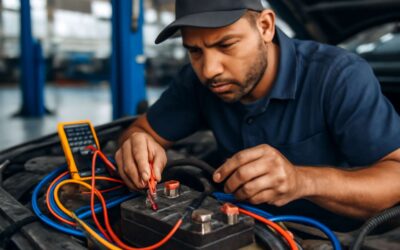
Auto electricians diagnose, repair and upgrade the electrical systems of motor vehicles. They typically work in auto service centers or garages, although some operate mobile businesses and travel to customers’ homes or workplaces.
The automotive industry is evolving at a rapid pace and the latest vehicles have advanced technology that includes built-in GPS and entertainment systems. These components require a specialized skill set and knowledge to install. As an auto electrician, you are expected to be able to perform these tasks in a safe and efficient manner.
Typical duties for an auto electrician include: * diagnosing problems with the vehicle’s electrical system: this involves testing wiring to find out what is causing the problem. You then use this information to determine the best course of action for the repair or replacement.
You must also provide the customer with a detailed estimate of costs and time frame for the repairs that need to be done. This ensures that the customer is comfortable with the cost and is aware of when they will receive their vehicle back.
Other responsibilities of an auto electrician include: * repairing and replacing electrical parts for the vehicle: this includes replacing faulty wiring or troubleshooting vehicle electrical systems. It also includes repairing and replacing damaged or faulty components that cannot be fixed with the current equipment available in your shop.
* installing electrical parts: this includes putting in new components and adding new accessories to a vehicle. These might include air conditioning units, braking units, and radio and television systems. This requires a high level of technical expertise, and you must be able to work with a wide range of power and hand tools.
If you have a passion for cars and want to become an auto electrician, you can begin by obtaining an apprenticeship. Apprenticeship programs are offered by local apprenticeship networks or Group Training Organisations. These are usually three to five years in length and provide hands-on experience in the field.
The job outlook for auto electricians is expected to be relatively stable. According to the U.S. Bureau of Labor Statistics, these professionals are projected to experience minimal growth through 2028. This is largely due to professionals moving into other roles or retirement from the labor force.
Skills that are essential for an auto electrician career include: ability to solve problems, communication skills, and mechanical aptitude. These skills allow you to quickly absorb new information about mechanical systems and understand how to use diagnostic equipment to narrow down issues.
Having mechanical aptitude can help you get better job opportunities as an auto electrician by showing employers that you are well-versed in the mechanics of electrical systems and understand how to use a variety of tools and equipment. Electronic knowledge is also important for an automotive electrician because you must be able to use computer-based tools that can identify and pinpoint specific issues in the electrical system of a vehicle.
It is important for an auto electrician to have the physical strength and stamina needed to do their job efficiently and safely. Often, you will be required to stand or hunch over for long periods of time, so it is important that you are in good health and fit. You may also have to work outdoors and in harsh conditions, so it is imperative that you are able to adapt your physical abilities to the job at hand.



0 Comments